| SHADOWS ON THE WALL | REVIEWS | NEWS | FESTIVAL | AWARDS | Q&A | ABOUT | TALKBACK | |||||
 Shadows off the beaten path Shadows off the beaten pathIndies, foreign, docs and shorts...
On this page:
MEDUSA |
MOTHER AND SON |
THE TUNNEL TO SUMMER, THE EXIT OF GOODBYES
| |||||
| See also: SHADOWS FILM FESTIVAL | Last update 25.Jun.23 | |||||
|
Medusa Review by Rich Cline | 
| |||||
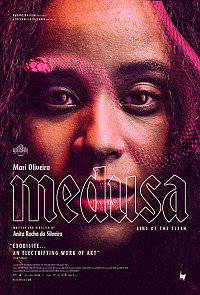 dir-scr Anita Rocha da Silveira prd Vania Catani, Fernanda Thurann, Mayra Auad with Mari Oliveira, Lara Tremouroux, Joana Medeiros, Felipe Frazao, Bruna Linzmeyer, Thiago Fragoso, Bruna G, Carol Romano, Anita Chaves, Natalia Balbino, Isadora Ruppert, Julianna Pimenta release Br 16.Mar.23, UK 14.Jul.23, US 28.Jul.23 21/Brazil 2h12 CANNES FILM FEST TORONTO FILM FEST  Is it streaming? |
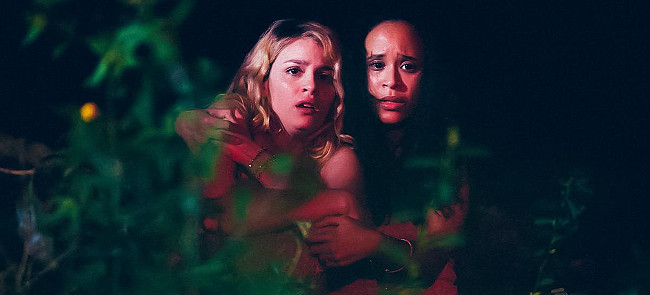 Pulsing with darkly intense energy, this Brazilian thriller has a fantastical sensibility that's dreamlike. Beautifully shot to wash the night in vivid colour, the inventive storytelling style challenges the viewer to lean in closer. Even as she allows the film to become indulgently overlong, writer-director Anita Rocha da Silva cleverly uses light, music and sound to create an intensely involving atmosphere. And the actors deliver earthy, honest performances. By day, 21-year-old Mariana (Oliveira) and her friends are the model of submissive feminine propriety in the strict Christian sect led by charismatic Pastor Guilherme (Fragoso). Then at night, they put on masks and prowl the city taking violent vigilante action against women they see as sinners. When one attack goes wrong, Mariana ends up with a scarred face, losing her job and prospects. Now she identifies with the missing actress Melissa (Linzmeyer), who was cleansed of her sinful life through a disfiguring facial injury. And now Maria's work entails caring for people in comas. On social media, church team leader Michele (Tremouroux) coaches followers on taking the perfect Christian selfie. But even she has haunting private thoughts. The filmmaker depicts a large number of religious ceremonies and rituals in considerable detail, plus recounting the story of Eve and the serpent and many cutaways to snake imagery. This feels somewhat excessive, as the point is already very clear. But these scenes do add to the film's magical sensibilities,, and along the way there are plenty of properly unnerving visuals, as events subtly twist in freaky ways. As Mari, Oliveira delivers a superbly textured performance, revealing the forbidden desires lurking under her nice-girl exterior. Even the more surreal scenes offer glimpses into her deeper feelings, as do the ways she rebels against various aspects of church life. This includes her lusty feelings toward hot fellow nurse Lucas (Frazao) and her complex relationship with Michele, played by Tremouroux with a superb mix of sunniness and shadow. The entire cast is committed to authenticity, even in the wilder sequences. The clear message here centres around how any attempt by an organised religion to control people is doomed to failure, simply because human nature finds its way to full expression through a range of transgressions. While the girls have camaraderie in their music group and the boys in their military exercises, their true motivations can only be repressed for so long. So the way sex and violence erupt in this community is hardly surprising, but it's urgently provocative.
| ||||
|
Mother and Son Un Petit Frère Review by Rich Cline | 
| |||||
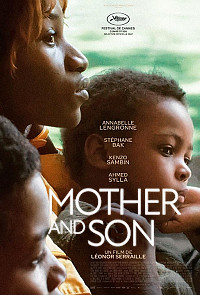 dir-scr Leonor Serraille prd Sandra da Fonseca with Annabelle Lengronne, Stephane Bak, Kenzo Sambin, Ahmed Sylla, Sidy Fofana, Milan Doucansi, Audrey Kouakou, Etienne Minoungou, Jean-Christophe Folly, Majd Mastoura, Thibaut Evrard, Angelina Woreth release Fr 1.Feb.23, UK 30.Jun.23 22/France 1h56 CANNES FILM FEST Is it streaming? |
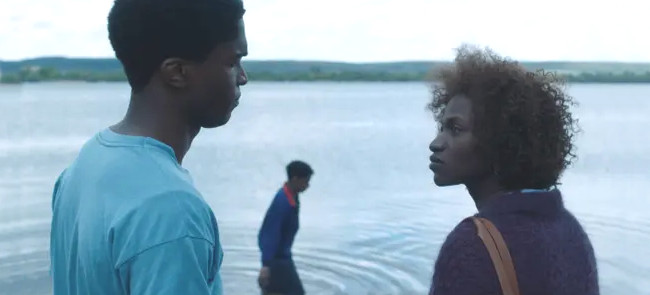 Quietly observational, this drama unfolds like a fly-on-the-wall documentary capturing events from the life of a migrant family over two decades. Writer-director Leonor Serraille lets the story emerge organically from scenes that play out to their own rhythms, and along the way the characters become especially vivid. Without shouting any issues loudly, the film makes provocative comments about the nature of identity, security and what's really important in life. In 1989, Rose (Lengronne) travels with 10-year-old son Jean (Fofana) and 5-year-old Ernest (Doucansi) from Ivory Coast to Paris, moving in with relatives (Kouakou and Minoungou). Being young, Rose gets offers from nice men like Jules (Folly), but she prefers earthier guys like Malick (Mastoura). And she moves the family to Rouen to be near Thierry (Evrard). Eight years later, Rose spends much of her time working, while Jean (now Bak) helps Ernest (now Sambin) with his studies. When Rose settles down with Jules, Jean begins to feel lost. And Ernest makes a decision. Narrated by the adult Ernest (Sylla), the story unfolds in chapters seen through the three characters' different points of view, revealing their personal thoughts and feelings in a variety of situations. This adds unusual texture to their interrelationships and individuality, with anecdotal sequences like Rose's surreal day out in a company owner's country manor, Jean's idyllic picnic with girlfriend Camille (Woreth) and Ernest's summer holiday with a friend's family. Through all of this, each of these three people are repeatedly asked about their origin and nationality, as if they don't belong. Performances have an understated authenticity that's often startling, as each actor offers details about journeys in both connections and internal thoughts. The young boys are unusually natural on-screen. Lengronne brings a complexity to Rose that continually subverts the stereotypes everyone sees in her. Her easy chemistry with various men is charming, and it becomes even more beautifully nuanced in an extended reunion scene with the charming Sylla, which carries a powerful emotional kick. Indeed, the complex interaction reflects the messiness of everyday situations for these three family members as the years flow by. Their bond is strong, even when they clash about something. In the final half hour, Ernest is teaching philosophy to a classroom of teens discussing the nature of time and how worries about the future create stress. This highlights intriguing running themes about how these characters bridge their past and present to create a life moving forward. It's subtle and a bit out of reach, but powerfully resonant.
| ||||
|
The Tunnel to Summer, the Exit of Goodbyes Review by Rich Cline | 
| |||||
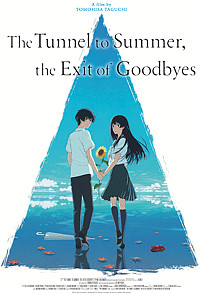 dir-scr Tomohisa Taguchi prd Akenosuke Kanazawa, Makiko Mameda, Keijiro Taguchi voices Oji Suzuka, Marie Iitoyo, Rikiya Koyama, Seiran Kobayashi, Tasuku Hatanaka, Arisa Komiya, Haruka Terui release Jpn 9.Sep.22, UK 14.Jul.23 22/Japan 1h23 Is it streaming? |
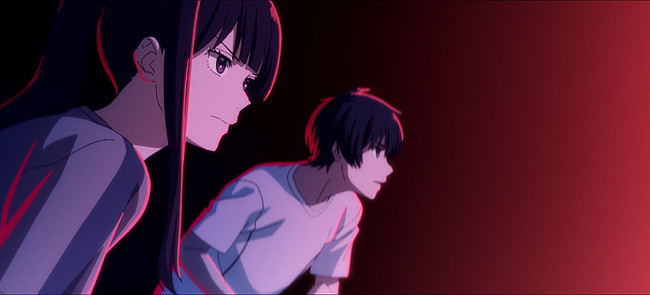 Beautifully animated in a vibrant style, this fantastical Japanese drama recounts a magical story that's infused with pain, hope and even a jolt of romance. Filmmaker Tomohisa Taguchi tells the story with a cinematic style that feels grown-up, even though it centres on teenagers. The plot may feel constructed and perhaps light on complexity, but there's a lot going on under the surface that holds the interest. At school, the students are fascinated by Anzu (Iitoyo), a new classmate who isn't afraid to stand up to mean girl Koharu (Komiya). And she finds a connection with shy Kaoru (Suzuka). One day in the woods, while escaping from his abusive father (Koyama), Kaoru stumbles into a mythical tunnel that grants your deepest wish in exchange for your time. His first trip inside costs him a week. And when Anzu discovers his secret, she wants to team up so they each get what they want. And both are chasing connections with someone they lost. Shifting between the sun-drenched seaside city and the deeply colour-drenched tunnel, the film's delightfully varied visual tone is consistantly surprising. Anzu and Kaoru develop a sparky friendship as they test just how much time the tunnel demands from each visit. They also try to find out if it's a historical feature, a religious relic or something else. Their intrepid experiments lead to some very funny moments, as these two outcasts put their quirky heads together to understand the mystery. And all of this is infused with more serious things taking place in their families. Both of these teens have issues with their parents. Anzu wants to write manga like her late grandfather, a gifted artist her parents rejected. Kaoru feels guilt over the accidental death of his little sister (Kobayashi), which drove their mother away and their dad to drink. The way the script deals with these things plays on issues of self-confidence, belonging and identity within the context of place and time. It's a clever approach to big themes, and the skilful animation brings the characters and settings sharply to life within the anime style. In quietly honest conversations, Anzu and Kaoru speak about their dreams for the future, encouraging each other even as real life around them continues to shift. In this sense, this mystical tunnel becomes essentially a metaphor within a metaphor. It sparks them to think about their future, and offers a way to grapple with their past. This adds a striking emotionality to the rose-hued climactic sequence, leading to a more traditionally satisfying conclusion.
| ||||

See also: SHADOWS FILM FESTIVAL © 2023 by Rich Cline, Shadows
on the Wall
HOME | REVIEWS | NEWS | FESTIVAL | AWARDS
| Q&A | ABOUT | TALKBACK | | ||||


